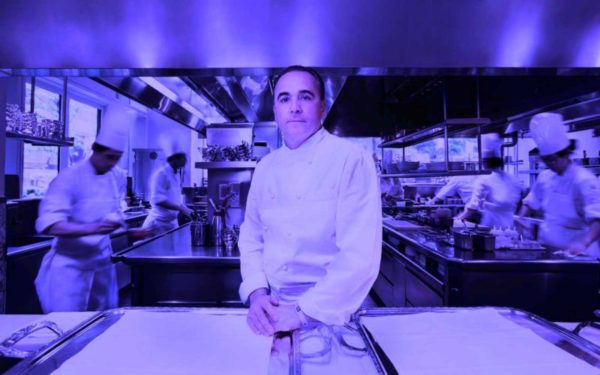Over the course of this mind-numbing period of isolation, restaurant chefs have saturated social media outlets with cooking tutorials, offering advice to ham-handed home chefs on how to improve their quarantine meals. Optimizing use of our pantries has turned even the most sophisticated epicureans into primal hoarders. Obsession over dried beans borders on the occult. Tinned fish—long relegated to the dusty back aisles of the grocery store—has become improbably trendy. Our living spaces have transformed into culinary incubators—scallions regenerating in our windowsills and sourdough starters that demand weekly feedings like quarantine pets that live in our refrigerators. Through it all, though, the collective heartbreak over missing restaurants is a lengthy trail of tears that winds its way through communities of all sizes across the globe. We all just want to fucking go out for dinner godamnit!
A restaurant in Philadelphia recently began offering video conferencing to its delivery customers through a portal where the owner virtually “serves” his clientele from inside the dining room of his restaurant. He stands beside your virtual table—water and wine already poured for you—and happily takes your order with music playing in the background. His novel approach is a timely reminder that good food always tastes better with great service.
The absence of restaurants is causing more heartache than many of us expected. They are are the glue that holds communities together—fortifying relationships and offering sanctuary for special occasions and personal milestones. Birthdays and anniversaries have come and gone in recent weeks with no brick-and-mortar place for people to congregate with their loved ones.
Great restaurant experiences are so much more that just delicious food. They etch themselves into our sense memories. The crisp skin of the Duck a l’Orange you had in Paris on your honeymoon. The briny seawater liquor of the clams in the Linguini alla Vongole you had along the water in Positano. The porky juices that erupted from the Xiao Long Bao you tasted for the very first time in Taipei.
Without being able to rely on these restaurant spaces to commune, the fabric of our society frays. Though many establishments continue to fulfill orders for takeout and delivery, the pandemic has forced many of us into the uncomfortable space of having to cook for ourselves and dine in our homes. Ironically, we need restaurants the most during times of crisis. It’s infinitely easier to put your anxieties aside when you have a trained staff feeding you and cleaning up your mess.
Home-cooked meals tend to be more slapdash. Throw everything in the Instant Pot and come back in an hour. Dining as a family unit has become less important than it once was. Digital distractions make it hard for us to dine at home with the same sense of abandon that we have eating out. It used to be that the only disruption was the occasional trill of the corded telephone—now we must deal with the constant pinging of notifications from Instagram, Snapchat, Facebook, Tik Tok and the seemingly endless barrage of apps that compete for our attention.
Recreating the structure of a restaurant meal at home isn’t easy, but there are some strategies that may help you emulate the adrenaline rush. The most important element is to make it fun. Do things that will force you to stay focused on what’s happening at the table. Be creative. The best restaurants obsessively pay attention to detail. The more effort you put into making your meal at home special, the more joy everyone should get out of the experience. Here are few simple ideas to get the ball rolling:
Make a “Reservation” in Advance – This might be more challenging for larger families than for couples, but rather than sitting down to dinner whenever the food is ready to be served, set a fixed time in advance for everyone to be seated. If she lives in your home, have Alexa remind everyone in the house that dinner starts at 8pm. Having a fixed “reservation” time formalizes the event, so it becomes an engagement rather than a casual gathering. Even if dinner isn’t completely ready at 8pm, it’s a nice time for everyone to sit around the table, have some cocktails and share conversation while they wait for dinner to begin.
Light Candles at the Table – This may seem like a small gesture, but softer lighting can make the experience feel more intimate. As restaurants always do, avoid using scented candles, if possible, as they will obscure the aroma and flavor of your food. If you can’t find any candles, improvise a centerpiece using seasonal fruits, vegetables, houseplants or flowers. A little table decoration can make an everyday meal feel like a special occasion. Dig deep and channel your inner Martha Stewart!

Print Dinner Menus – These don’t have to be anything fancy. You can even write them by hand on pieces of scratch paper. Analog touches like this are often healthy reminders to everyone that we need to slow our digital lives down. If you have children, ask them to help you design the menus with crayons or markers. You can also let them role play as waiters and go around the table to take everyone’s order. It’s a great way to keep everyone engaged, and your printed menus can also be a nice keepsake as a memento of this crazy time.
Get Dressed Up – Let’s be honest, most of us have been lying around in sweatpants and hoodies for over a month. Showering has become optional. Putting on a button down shirt, a pair of nice slacks or a dress feels like such a hassle. Who are we trying to impress? But there’s something about wearing nice clothes to the dinner table that makes the occasion feel more luxurious. You don’t have to do this every night of the week, but, even if you’re having a casual meal, wearing nicer clothes is a way to make your dining room at home feel more like a night on the town.
Create a Music Playlist – Many restaurants hire third parties to program music for them because playlists are critical to creating the right energy in the dining room. Think about what you’re serving and try to match the music to the cuisine. If your recipes originate from a particular country, find some cool music by some of its native artists. If what you’re cooking doesn’t fit under the umbrella of a particular ethnicity, just pick music that you like and that you think your company will enjoy, too.
Choose Someone to Be the “Server” – It’s fun to have someone else bring you things, so you can relax and enjoy yourself. Delegating those responsibilities to one person any given night is a nice way to recreate the service experience you get in a restaurant. Even better, divvy up the duties so that everyone has an alternating role—clearing plates, getting dessert ready, making coffee. Try to set it up so that everyone can enjoy at least some time to sit back and be served, just like they would in a real restaurant.

Plate Your Takeout Food on Proper Dishes – Whether you’re cooking yourself or ordering takeout food, break out your best plates—even the tacky ones that your grandmother passed down that’ve been in storage for years. Sure, the disposability of takeout containers is more convenient and limits the clean-up, but it also takes some of the poetry out of enjoying well-presented food. Take a little extra time to carefully remove the food from its containers and plate it artfully like a restaurant chef would. Even garnish it with a chiffonade of your own chopped parsley.
Decant Your Bottle of Wine – You don’t have a wine decanter? No problem! Find another vessel like a glass pitcher you use for iced tea or a clear flower vase. Just improvise—even a quart-sized Mason jar or a glass milk bottle will do the trick. There is something about letting your wine “breathe,” even if it isn’t an expensive bottle, that makes drinking it more ceremonious. These extra little touches distinguish restaurant dining from simple meals at home.
Invite Other Friends to Join Remotely – Don’t just plan a Zoom chat with friends, invite them to have a virtual dinner together! Share a few recipes a day or two before then connect through one of the many teleconferencing apps. Not only will it be nice to see friendly faces, but it will be fun to compare notes about your shared cooking projects. As with restaurant meals, bad food can always be rescued by great company.



